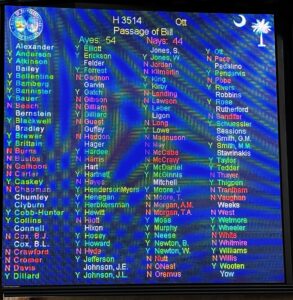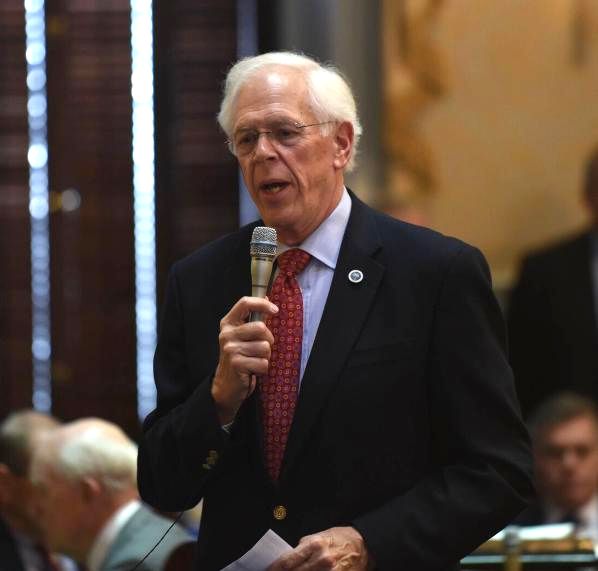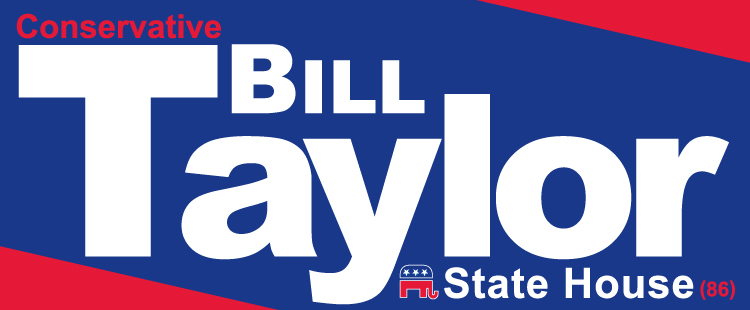Dear Friends:
Throughout the ‘Bible Belt’ wagering is controversial, and socially conservative South Carolina, is no exception. That was evidenced Wednesday on the floor of the House of Representatives during the five-hour debate on a bill that would allow online wagering on horse races. A portion of the licensing fee would help boost SC’s equine industry, which is struggling to compete with neighboring states supported by innovative pro-horse legislation.
Topping the News
Supporting SC’s Horse Industry
I represent a large swath of horse country in rural Aiken County. That’s why I co-sponsored and championed legislation to allow tax revenue from betting profits to be directed to operate a state equine commission that would provide grants to our equine industry.
Aiken’s Jack Sadler, President of SC’s Thoroughbred Owners and Breeders Association, cited the decline of the equine industry in Aiken and around the state as the reason this legislation is needed.
“This legislation is intended to help rebuild our Thoroughbred population but the whole equine industry across the state. It will benefit professional and recreational horse sports, farriers, trainers, stable hands, farmers, tack stores, veterinarians, feed stores, and nonprofits. It will also help protect land conservation,” said Sadler.
 The South Carolina Equine Advancement Act (H.3514) would allow bets to be made through advanced deposit wagering (ADW). Bettors would open an account with an approved operator, like a Fan Duel or Draft Kings, to deposit money. They could then use their cell phones to wager on races nationwide. Money would be added to an account after winning a wager.
The South Carolina Equine Advancement Act (H.3514) would allow bets to be made through advanced deposit wagering (ADW). Bettors would open an account with an approved operator, like a Fan Duel or Draft Kings, to deposit money. They could then use their cell phones to wager on races nationwide. Money would be added to an account after winning a wager.
Individual winnings would not specifically be taxed under this legislation. A minimum of 10% on the vendors’ adjusted gross revenues from wagers would be directed to the horse industry.
Some Republican opponents vehemently objected to the gambling bill on moral grounds and offered a score of amendments to cripple the bill. Proponents for allowing wagering on horse races say the practice is already taking place in SC, but illegally. It is estimated that $2.3 billion in illegal sports bets are placed annually in SC. Legalizing it allows the state to regulate it and tax it. Horse betting is allowed in 39 states.
Wednesday’s vote was a photo-finish with the outcome in doubt until the final vote of 54-44. The bill has been sent to the Senate.
Victory: Stopping ESG
 The SC House signed off on legislation requiring the state’s retirement system to consider only “pecuniary factors” when making investment decisions. Simply said, they are to maximize monetary returns for the 600,000+ retirees in the state system. That essentially bars the retirement system from using environmental, social and governance (ESG) factors.
The SC House signed off on legislation requiring the state’s retirement system to consider only “pecuniary factors” when making investment decisions. Simply said, they are to maximize monetary returns for the 600,000+ retirees in the state system. That essentially bars the retirement system from using environmental, social and governance (ESG) factors.
The “ESG Pension Protection Act” (H.3690) won bi-partisan support in a 103-5 vote sending it to the Senate.
I filed this bill because we cannot sit back and risk that the mega-investment firms will use the power of our pension funds to coerce corporate executives to invest in social objectives at the expense of hard-working South Carolinians.
“This crucial bill will protect South Carolinians’ retirement savings by ensuring fiduciary responsibility and prohibiting unsound, politically motivated investments,” said Candace Carroll, the SC State Director for Americans for Prosperity.
Carroll added, “From Congress to state capitals across the country, lawmakers are rejecting radical ESG ideals that threaten to hold retirement accounts hostage.”
Want to Learn More? I wrote a detailed explanation of ESG and this legislation in last week’s newsletter.
Adoption Reform Passes
This week the House passed a collection of five adoption-related bills designed to make adopting children in our state less burdensome while ensuring safety and integrity. These bills facilitate family members to become legal guardians when adoption is not an option for minors, eliminate the 90-day waiting time to finalize an adoption, allow family court judges to waive pre- and post-adoption report requirements, speed up the adoption process, and allow permanency planning hearings to include termination of parental rights determinations. These bills passed unanimously and marked some of the most significant efforts to make adoption easier for families.
Distracted Driving Month
 It’s official — April is ‘DISTRACTED DRIVER AWARENESS MONTH’ in SC. During their Statehouse rally this week, I presented my House-Senate Resolution to SC’s ABATE motorcycle group, one of many organizations wanting to see a SC distracted driving bill enacted.
It’s official — April is ‘DISTRACTED DRIVER AWARENESS MONTH’ in SC. During their Statehouse rally this week, I presented my House-Senate Resolution to SC’s ABATE motorcycle group, one of many organizations wanting to see a SC distracted driving bill enacted.
Nationally, distracted driving deaths increased by 12% to 3,522 in 2021. Experts call that “staggering.” Nearly two-thirds of states already have hands-free driving laws on the books, but NOT SC. We continue to push for passage of the Hands-Free bill in both the House and Senate.
We will eventually win because 80% of South Carolinians favor HANDS-FREE for drivers.
LEGISLATIVE BRIEFS
The Legislative Rush
 It was crossover deadline week at the Statehouse. That means bills that could possibly be enacted this year must be sent to the other chamber if they are to be voted on during this first year of the session. That meant we considered many bills this week with long days of debate. Therefore, I have a lot to report.
It was crossover deadline week at the Statehouse. That means bills that could possibly be enacted this year must be sent to the other chamber if they are to be voted on during this first year of the session. That meant we considered many bills this week with long days of debate. Therefore, I have a lot to report.
School Choice Advances
Thursday morning, the House Education Committee voted to advance legislation to the House floor that would create a significant school choice option for many parents. S.39 creates Education Savings Accounts, which has taken America by storm in the last few years.
 Former Florida Governor Jeb Bush visited the Statehouse this week advocating for expansion of school choice in SC. A champion of school choice in America, he spoke to members of the House Republican Caucus.
Former Florida Governor Jeb Bush visited the Statehouse this week advocating for expansion of school choice in SC. A champion of school choice in America, he spoke to members of the House Republican Caucus.
Four states have adopted universal school choice already this year – Florida just extended school choice to every child, following Iowa, Utah, and Arkansas. A total of 29 states are considering school choice bills this year. The House will vote on this ESA bill in two weeks when it returns from its Easter furlough week.
Paid Parental Leave for School District Employees
Allowing new parents to take time off to care for their children without sacrificing their income or job security is critical in retaining experienced teachers and attracting new teachers. On Wednesday, I voted in support of H.3908, which will allow teachers who become new parents (either upon the birth or adoption of a child) six weeks of paid leave which is the same leave available to other state employees.
Banning the ‘Carolina Squat Truck’
The dangerous’ Carolina Squat Trucks’ would be banned based on a bill (H.3414) passed by the House. A ‘squat’ is a vehicle modification that raises the front end of a vehicle high enough that it impedes a driver’s ability to see over the hood. This endangers pedestrians, especially small children, and creates safety hazards, including large blind spots, braking difficulties, and airbag malfunctions. There have been many fatalities across our state, including a child in Myrtle Beach.
Senate: Gun Bill Advances
The ‘Constitutional Carry’ gun legislation passed by the House in February took its first step forward in the Senate when it advanced in a 3-2 subcommittee vote this week. The legislation allows adults in SC to carry a handgun without a government permit legally. The bill would allow anyone 18 and older who can legally buy a gun to carry concealed or openly.
More than half of states have similar laws, with Florida being the latest added this week. Proponents contend permit requirements only affect law-abiding gun owners since criminals will carry around a gun regardless. A significant focus of the bill creates a felon-in-possession crime that law enforcement has sought for years to combat violent crime.
Splitting DHEC
Legislation (H.4124) to split SC’s Department of Health & Environmental Control (DHEC) into two separate divisions passed the House 97-16 and was sent to the Senate. DHEC employs more than 3,500. Advocates contend DHEC is too large, and the health and environmental responsibilities would be better served with two divisions solely focused on their specialized missions.
Tampon Tax Exemption
Currently, women pay sales tax when they purchase feminine hygiene products such as tampons or pads. But if a man buys an erectile dysfunction drug, the purchase is not taxed. A bill passed by the House this week would change that. H.3563 would exempt feminine hygiene products from sales taxes. The state would give up about $5.9 million in annual revenue by nixing a so-called tampon tax. Advocates for the exemption say sales taxes can be regressive and taxing these products hurts poor people, and women should not have to choose between their essential needs.
Film Incentives Advances
Georgia has become a significant home to movie and television productions because they offer incentives. To further entice and support film production from major studios, the House voted 77-20 to send H.4020 to the Senate. It provides the SC Film Commission a much larger pot of money to lure productions to the state by boosting the incentive pool from its current $10 million per year to $30 million. A Senate bill would cap the amount at $40 million. It’s a money game for productions. The Film Commission has long sought extra funding to compete with neighboring states. They have turned away nearly $1.5 billion in production budgets since 2012 because of a lack of incentive money.
Supplying Lifesaving Medication
As the opioid epidemic continues to affect communities across the nation, we must make lifesaving medications available in our schools to respond quickly to an overdose emergency and potentially save the life of a student or staff member. The House voted to pass H.4122, which will allow school nurses, in addition to School Resource Officers, to stock and administer Narcan. DHEC has already allocated funding to purchase the medication.
The House also unanimously passed H.3691, which allows coroners to stock and administer lifesaving medication such as Narcan if they encounter overdose victims.
Ensuring Integrity in Our Elections
Maintaining election integrity is crucial for ensuring that the democratic process remains fair and transparent and that the outcomes of elections accurately reflect the will of the people.
This week the Constitutional Laws Subcommittee heard two election integrity bills; H.3695 will require voters to register as a party member or as an unaffiliated voter with a particular party at least 45 days before voting in that party’s primary, and H.3823 would limit the number of times one person can witness absentee ballot signatures to five.
Firefighters Honored
 One of the highlights of the legislative session is the opportunity to honor our SC firefighters during their annual Statehouse Legislative Day. Firefighters always stand ready to rush into a burning building or respond to accidents and medical emergencies. Even more impressive is that 70% of firefighters in America are volunteers. Rep. Bart Blackwell, Rep. Melissa Oremus, and I celebrated representatives of various Aiken County fire departments following our luncheon.
One of the highlights of the legislative session is the opportunity to honor our SC firefighters during their annual Statehouse Legislative Day. Firefighters always stand ready to rush into a burning building or respond to accidents and medical emergencies. Even more impressive is that 70% of firefighters in America are volunteers. Rep. Bart Blackwell, Rep. Melissa Oremus, and I celebrated representatives of various Aiken County fire departments following our luncheon.
MONEY TALK
Senate Budget Debate
The Senate Finance Committee has finished work on its version of the state budget that the full Senate will debate. Their plan would provide bigger raises than proposed by the House budget.
The committee approved spending $155.6 million on state employee raises. That is $31 million more than the House budget allocated last month. Under the Senate proposal, state employees earning less than $50,000 a year would receive a $2,500 pay hike. Those earning more than $50,000 would receive a 5% raise. That gives larger percentage increases to those lower on the payroll because the effects of inflation are hitting them the hardest.
Senators agreed with the House plan to raise the minimum teacher pay by $2,500, bringing the starting pay for teachers in the state to $42,500.
Senate budget writers also proposed investing $540 million for deferred maintenance and other capital projects at colleges and universities. That includes $75 million to build a veterinary school at Clemson University. The state does not have a veterinary school, which forces students to go out of the state to study to be a veterinarian.
The Senate’s budget includes an additional $3.2 million for the SC Election Commission to train and support county elections workers. The expenditures are aimed at increasing the integrity, security, and accuracy of elections in the state, according to budget writers.
PHOTO OF THE WEEK
 One sure sign that it is Master’s Week — the expensive ‘corporate birds’ flock to the Aiken Airport.
One sure sign that it is Master’s Week — the expensive ‘corporate birds’ flock to the Aiken Airport.
Want to Know More?
Do you want to learn more about my positions, bill sponsorships, voting record, and past writings? Here are some handy links:
- About Me: https://taylorschouse.com/about-2/
- My Positions: https://taylorschouse.com/issues/
- Sponsored Bill & Voting Record: http://tiny.cc/b1pouz
- Recent Newsletters: https://taylorschouse.com/category/newsletter/
I’m Available & AT YOUR SERVICE

It is my honor to be of service. Please do not hesitate to contact me if you need assistance navigating state government or have any thoughts or concerns about the legislature.
In Your Service,

Email: Bill@taylorschouse.com
www.TaylorSCHouse.com
Newsletter not paid using taxpayer funds.
Legal Notice: This newsletter is not a solicitation for contributions to any SC registered lobbyist.

